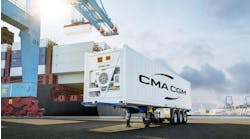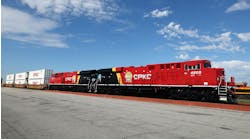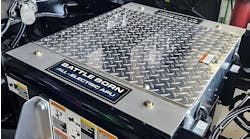Twin Express Grows with Good Driver, Customer Communication
Success in trucking depends on good communication supported by new equipment and technology, says Brad McAlister, president of Twin Express Inc in Maple Grove, Minnesota, a northern suburb of Minneapolis.
"You need to know your customers and communicate with your drivers," says McAlister, who founded Twin Express, a refrigerated truckload carrier specializing in hauling food to ports - much of it for export.
Besides insisting on good communication, McAlister provides the tools to achieve it. He operates on two rules: use only late model tractors and trailers, and equip the fleet with the latest communications technology.
"We bought cell phones shortly after the company started in 1988," he says. "A few years later, we purchased Qualcomm satellite tracking," he says. "All our tractors now are equipped with Qualcomm. We get automatic updates on truck location every five minutes. Our fleet consists only of 1999, 2000, and 2001 models."
The Twin Express fleet has grown from 20 tractors and trailers in 1988 to 75 tractors and 85 refrigerated trailers today. Twin Express runs mostly International 9000 series Class 8 trucks and uses Great Dane 53-ft trailers.
"We do a little LTL but mainly long-haul truckload," McAlister says. "Our main lane is from the Upper Midwest - Minnesota, Iowa, and western Wisconsin - to California, Arizona, Nevada, Oregon, and Washington. We also run to the Northeast and to the Southeast. We serve Georgia, Florida, Alabama, and Texas in the South, and Maryland, New Jersey, New York, Pennsylvania, Delaware, Connecticut, and Massachusetts on the East Coast."
Though Twin Express occasionally goes into New York City, it is not a primary destination. "We don't market ourselves there," he says. "First of all, it is very expensive to get into New York because of tolls. Secondly, our 53-ft trailers can't maneuver well in the narrow streets of New York."
McAlister approaches trucking from the perspective of a shipper. Before founding Twin Express 12 years ago, he worked for a meat exporting company where he was in charge of the international transportation department.
Regulation Days "I got so upset with truck lines back in the regulated days in the 1970s," he says. "I was in charge of chartering ships and airplanes and scheduling longshoremen, but I couldn't get truckers to stay on schedule. You might expect railroads to be late, but you expect trucks to be on time."
Of course, trucking was deregulated in 1980, and service got better. Nevertheless, when McAlister started his own trucking company in 1988, he drew on that previous experience working for a shipper to formulate his new company's goals.
"Our main goal is to provide the most economical service we can," he says. "This means being on time for pick-up and delivery appointments. If occasionally a truck is going to be late, we are honest with our customers and notify them immediately."
From the Midwest, Twin Express hauls mainly refrigerated products including fresh and frozen meat, frozen turkey, frozen bakery products, and processed food. Occasionally, loads are nonrefrigerated. For instance, Twin Express recently hauled compressors for refrigerators, inbound from Brazil, from the Northeast to Minnesota.
Driver-Friendly Company Exports go to transfer facilities in ports on the East and West Coasts, as well as to Tampa and Houston on the Gulf Coast. At the port, cargo is unloaded from Twin Express and stuffed into refrigerated intermodal containers.
Average trip time is eight to 10 days, requiring hard work from drivers, McAlister says. However, Twin Express has been successful in attracting and retaining good drivers.
"We want to be a driver-friendly company," he says. "For example, if a driver says he wants to be home for his wife's birthday, we do our best to accommodate him. We don't keep drivers on the road for weeks at a time. After a run, they have two days off before starting again."
About half of Twin Express' 85 drivers are owner-operators. The rest are employees. The great majority drive solo. The company has only 14 drivers who work in pairs, and these are husband-and-wife teams. "Teams are used on most produce moves from the West Coast to Illinois, Michigan, and Minnesota," McAlister says. "Produce is very time-sensitive."
Twin Express fosters driver loyalty through a program that allows contractors to purchase new tractors using the company's buying power. About 15 drivers so far have taken advantage of the lease-to-purchase program, he says.
Lease-to-Purchase Program "That's our goal: To put contractors into new trucks and get them on their own," McAlister says. A new tractor may cost a contractor $100,000 or more. With the company's buying power, Twin Express can buy it at closer to $95,000. This savings is passed on to contractors in reduced monthly payments in a lease with a purchase option. Contractors can build equity in the tractor. They can realize this equity at the end of the lease by exercising their purchase option. They can continue to run the truck, sell it, or use the equity and trade in for a new truck.
The challenge for contractors is to put enough miles on the leased trucks to make the monthly payments and build up their cash reserves. "It takes commitment from contractors to earn enough to pay for a new tractor," he says. "They will be successful if they drive 10,000 to 12,000 miles per month. If they run only 8,000 to 9,000 miles per month, they won't cover their costs."
In July 2000, Twin Express put 25 new 2001 model International tractors in operation. Thirteen are International 9400s and 12 are International 9900s. The tractors differ in design. The 9400 has a sleeker design with an aerodynamically styled hood, while the 9900 has the traditional long-nose hood with wide chrome grille. But the tractors are equipped virtually the same, says Bob Clements, general manager of Twin Express.
"These are premium tractors, the kind that owner-operators use," Clements says. "They are equipped with stand-up sleepers and are designed for driver comfort." The tractors have 72-inch Hi-Rise Pro sleepers.
Drivers like the Internationals especially because they provide a smooth ride, McAlister adds. "We specify tractors with air suspension and air-ride seats," he says. The driver sits in a National Cush-N-Aire Model 195 high-back vinyl seat. It has two arm rests, lumbar support, and seat-back adjustment and swivel.
Tractors are powered by Caterpillar C-15 engines rated at 435 horsepower at 1800 rpm, but the engine will provide a maximum 450 hp and 1,650 lb-ft torque, McAlister says. Tractors are equipped with Eaton Fuller RTLOF-16913A 13-speed manual transmissions with double overdrive and Meritor RT-40-145 40,000-lb-capacity tandem drive axles with a 3.58:1 final drive ratio. Air suspension is from International.
Twin Express rewards drivers for saving fuel. Drivers who achieve the fuel efficiency goal are paid quarterly bonuses. The bonus increases as the mileage per gallon increases. The maximum bonus is 2.4 cents-per-mile.
"We have one driver who is phenomenal. He consistently gets between 6.9 to 7.2 miles per gallon," McAlister says. "That's very good for pulling a refrigerated trailer across the western US."
Diamond Spec Program Twin Express chooses the International 9000 series because of the extended warranty offered through International's Diamond SPEC and Diamond PLUS programs. "We used to trade tractors every three years, but with the extended warranties and better spec'ing we're now on four-year cycles," McAlister says.
The warranty covers all repair for 200,000 miles or two years, whichever comes first. The bumper-to-bumper warranty covers everything except wear items such as clutches, brakes, belts, lights, and normal door and hood adjustments, Clements says. The extended warranty covers engines and transmissions for 300,000 miles or three years; alternators, starters, and air-conditioners for 450,000 miles or three years; and drive axles for 500,000 miles.
Twin Express owns its tractors and trailers but contracts with Penske Truck Leasing to provide all maintenance. Besides preventive maintenance and repair for tractors, trailers, and refrigeration units, Penske provides emergency road service. It has 600 shop locations nationwide.
Most maintenance and repairs are performed at the Penske shop in Brooklyn Park, Minnesota, about 10 miles from Twin Express headquarters. Besides providing full vehicle maintenance, Penske handles all vehicle licensing and permits, tracks fuel taxes, and coordinates road breakdown repairs, says Brian Clark, Penske lease sales representative.
25 New Great Danes The company put 25 new tractors in service this year, and also recently took delivery of 25 new Great Dane 53-ft refrigerated trailers, equipped with Thermo King SB-III Whisper Edition units. Trailers have two inches of insulation in the sidewalls, four inches in the front, three inches in the roof, and two and a half inches in the floor.
The trailers have aluminum duct floors and rear swing doors. They are equipped with Hendrickson HKA-180 Vantraax air suspension. "We run good-looking, clean trailers," Clements says. "Along with premium tractors, they help instill driver pride. We trade trailers on short, four-year cycles because we want to be at the top of the curve on new technology. We want trailers with the latest improvements in suspensions, LED lights, and antilock braking systems."
Even with premium-spec'd equipment, Twin Express, like every other refrigerated carrier, must deal occasionally with unforeseen delays due to weather or other circumstances. "We can't do the impossible," McAlister says. "Customers sometimes forget that in this hurry-up age. For example, you can't expect an order that you make on Monday afternoon to move from Chicago to California by Tuesday morning."
The key is good communication, McAlister stresses. Using the Qualcomm tracking system, he can keep tabs on all company trucks at all times. The next step for Twin Express, he says, is to allow customers direct access by computer to track the progress of their orders as they are being shipped. "That's easily done," he says. "And we intend to do it."


